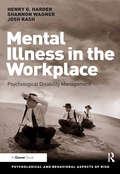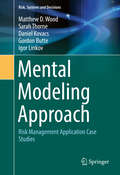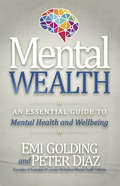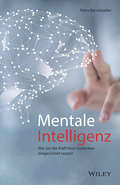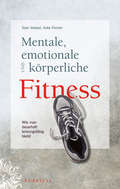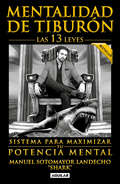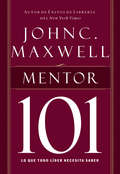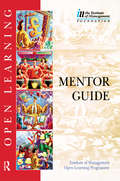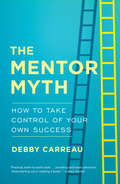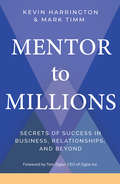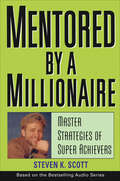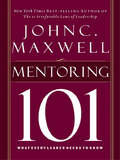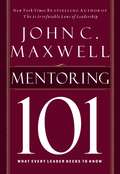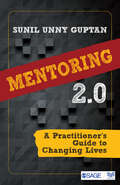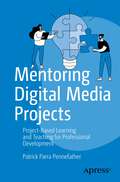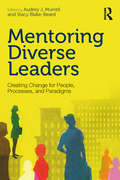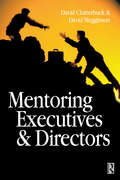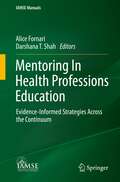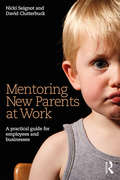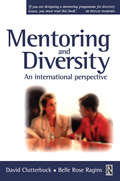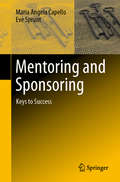- Table View
- List View
Mental Illness in the Workplace: Psychological Disability Management (Psychological and Behavioural Aspects of Risk)
by Henry G. Harder Shannon Wagner Josh RashThe extent of mental illness concerns in the workforce is becoming increasingly apparent. Stress, depression, anxiety, workplace bullying and other issues are costing businesses billions every year in lost productivity, poor treatments and employee retention. Unless appropriately addressed, issues related to mental illness difficulties will result in stiff financial, organizational, and human costs for organizations. The authors of Mental Illness in the Workplace provide a practical guide to identifying, understanding, treating and preventing individual and organizational mental health issues. They illustrate how organizations can save money and improve the health and well-being of their employees by using a psychological disability management approach in the treatment and accommodation of mental illness issues. Drawing on empirical evidence from North America, the United Kingdom, Australia and New Zealand, the book is in three parts. The first addresses the scope of mental health issues in the workplace. The second part describes the most common mental illnesses found in the workplace, while the third focuses on prevention and treatment of mental health issues. This book will meet the needs of human resources professionals, administrators of employee assistance programs, industrial and organizational psychologists, mental health practitioners, those teaching or studying psychology and disability management, and more generally will serve to enlighten students of business management and practicing managers regarding a major workforce risk factor.
Mental Modeling Approach
by Igor Linkov Matthew D. Wood Sarah Thorne Daniel Kovacs Gordon ButteThis book provides an easy-to-read, user-oriented introduction to mental models research and Mental Modeling TechnologyTM. Mental models are powerful influences human behavior. The book offers insight from the developers and most experienced application professionals of a widely proven methodology for understanding and influencing human judgment, decision making and behavior. The case studies show examples of the methodological concepts in their application context. It is one of the most comprehensive collections of cases focused on government needs of any similar qualitative analysis approach. Finally, it presents an introduction to software tools and tutorials that enable readers to use the approach for their own research needs.
Mental Wealth: An Essential Guide to Workplace Mental Health and Wellbeing
by Emi Golding Peter DiazMental Wealth reveals an approach to workplace mental health and wellbeing that is proven to actually get results. Despite having a huge impact on the productivity, profitability, and culture of organizations, there is very little guidance currently provided to managers and leaders on how to effectively manage workplace mental health and wellbeing. What does exist is often focused on the legal aspects of minimizing risk that it misses the psychology of workplace mental health and high performance and actually ends up creating risk for workplaces.Mental Wealth is a guide for managers and leaders on how to manage employees who may be experiencing mental health issues in the workplace. Founders of the Workplace Mental Health Institute, Peter Diaz and Emi Golding, provide an essential foundation for addressing workplace mental health. Some of the essential foundations discussed include dispelling myths about workplace mental health, the factors that cause and contribute to mental health issues, the impact those factors are having on workplaces, the benefits of addressing mental health appropriately, and 7 Pillars for a mentally Wealthy Workplace. Mental Wealth also includes case studies and practical strategies that can be implemented for immediate results.
Mentale Intelligenz: Wie Sie die Kraft Ihrer Gedanken zielgerichtet nutzen
by Petra BernatzederIm Buch von Petra Bernatzeder erfahren die Leser, was die Profis aus dem Sport mental trainieren und wie auch sie diese Techniken in ihrem beruflichen Alltag nutzen können, um über mehr Kraft und Souveränität zu verfügen: Ressourcen, die immer wichtiger werden, da es vielen Menschen in unserer hochdynamischen Welt schwerfällt, Schritt zu halten und die Fülle an Möglichkeiten für sich zu nutzen. Andere sind erschöpft angesichts ihrer Zukunftsängste und den tiefgreifenden Veränderungen unserer Zeit oder tappen immer wieder in dieselbe Gedanken-Falle. Sie blockieren sich selbst und verhindern, ihr Potenzial voll auszuschöpfen. Petra Bernatzeder erklärt, was es bringt, mentale Intelligenz zu erwerben, zu verstehen und den Fluss seiner Gedanken zielgerichtet einzusetzen. Mit einem kurzen Einblick in die Neurobiologie unseres Gehirns erkennen die Leser dieses Buchs, welchen Einfluss mentale Bilder auf unsere Gefühle haben, auf unsere Konzentration, den Stoffwechsel, das Wohlbefinden, die Gesundheit, Leistungsfähigkeit ... und damit auf unseren Erfolg. Sie lernen, sich intelligent mental zu steuern und Stress keine Angriffsfläche mehr zu bieten. Das Buch ist gefüllt mit Praxisbeispielen und Übungen, zum Beispiel zu den Themen Wohlfühlen und Entspannen, Erfolg in kritischen Situationen, Flow kreieren, Energien auftanken, Abschalten und Umschalten. Außerdem zeigt die Autorin, wie sich mentale Intelligenz in den persönlichen Alltag integrieren lässt, durch den Aufbau neuer Gewohnheiten, das Schaffen von Ritualen und den Einsatz von Trainingseinheiten.
Mentale Stärke im Beruf: Resilienz und Leistungsfähigkeit maximieren (essentials)
by Erich R. UnkrigDas Buch zeigt, dass mentale Stärke im beruflichen Kontext ein entscheidender Faktor für Leistung und Erfolg von Einzelnen, Teams sowie Organisationen ist.Der Autor beantwortet kompakt und fundiert Fragen zu den Themen: Worin unterscheiden sich mentale Gesundheit, mentales Wohlbefinden, Resilienz und mentale Stärke? Welche Faktoren machen uns mental stark? Wie sieht ein zeitgemäßes Modell mentaler Stärke in der Unternehmenspraxis aus?Mentale Stärke beschreibt die Geisteshaltung, die jeder Mensch bei dem, was er tut, an den Tag legt. Sie erklärt, warum Menschen und Organisationen sich so verhalten, wie sie es tun. Untersuchungen zeigen, dass mentale Stärke die Ergebnisse von Einzelnen und Organisationen beeinflusst. Selbst in schwierigen Zeiten und unter besonderen Herausforderungen bringen mental starke Menschen mehr Leistung, arbeiten zielgerichteter und engagieren sich stärker für ihre Ziele. Dies führt zu einem besseren Output und steigert die Wettbewerbsfähigkeit der Organisation. Gleichzeitig können mental starke Menschen Stress besser bewältigen und entwickeln seltener psychische Probleme.
Mentale, emotionale und körperliche Fitness: Wie man dauerhaft leistungsfähig bleibt
by Anke Fischer Sven C. VoelpelUnser Leben verlangt permanente Höchstleistung, im Beruf und privat. Dafür brauchen wir viel Energie. Wird diese Energie in ausreichender Menge zugeführt, bleibt unser körperliches und mentales Gleichgewicht erhalten. Andernfalls holt sich der Organismus das, was er braucht, aus Reservespeichern, die eigentlich für das Funktionieren der täglichen Energiekreisläufe gedacht sind. Sind diese Speicher leer, ist unsere Leistungsfähigkeit drastisch reduziert. Die Ausbeutung des Körpers wird oft erst sichtbar, wenn es möglicherweise schon zu spät ist, regulierend in den Energiehaushalt einzugreifen. Ergebnisse sind Krankheiten wie Burnout, körperlicher Verschleiß, physiologische Mangelerscheinungen oder Schlafstörungen. Wie aber können wir hohe Leistung vollbringen, ohne uns körperlich, mental oder emotional derart zu verausgaben, dass irreparable Defizite entstehen? Optimale Ernährung, ausreichend Bewegung und mentale Fitness sind nach dem heutigen Wissensstand ausschlaggebend dafür, dass wir dauerhaft leistungsfähig bleiben. Doch was bedeutet das für uns persönlich? Nicht jeder Mensch funktioniert gleich. Diesem Umstand werden die praktischen Tipps und Empfehlungen dieses Buches gerecht: Mittels Checklisten und Selbsttests können wir uns selbst einschätzen und erfahren, auf welchem Stand wir sind. Mit den angebotenen Strategien und Maßnahmen können wir unsere Fitness typgerecht optimieren. Schlagworte: Ernährung ? Schlaf und Erholung ? Stress, Depression und Burnout ? Tagesplanung und Zeitmanagement ? Persönlichkeitstypen ? Entspannungstechniken ? Werte, Visionen, Erwartungen ? Kompetenzen und Motivation ? Kommunikationstypen und -stile ? Sozialkompetenz ? Glück und Religion ? Intelligenz und Wissen ? Lernen und Gedächtnis ? Genetische Grundlagen ? Sport und Bewegung ? Übungen im Büro ?Das Buch zeigt wunderschön ganzheitliche Wege zur Fitness auf. Sehr zu empfehlen für gesundheitsbewusste Menschen, die mehr wollen als Körperkult und Diätkriege.? Oliver Gassmann, Professor für Innovationsmanagement an der Universität St. Gallen ?Wer dieses Buch liest und das präsentierte Wissen für sich umsetzt, verbessert seine beruflichen Aussichten und erhöht die Chancen auf persönliche Zufriedenheit.? Eric Kearney, Professor für Führung, Organisation und Personal, Universität Potsdam
Mentalidad de tiburón: Las 13 leyes sistema para maximizar tu potencia mental
by Manuel Sotomayor«El éxito nunca tendrá el mismo valor, si no dejamos camino para los que vienen detrás compartiendo los mismos sueños.» -Manuel Sotomayor La historia nos ha enseñado, que quienes conquistan, quienes crean, quienes inventan y transforman el rumbo de la vida, han tenido una gran característica en común, son imparables, una vez decidido su plan, su meta, su idea, no hay marcha atrás, no hay nada que pueda detenerlos o cambiar esa idea de su mente. Personajes desde la antigüedad, como Alejandro Magno, pasando por Leonardo da Vinci, Federico el Grande, Mozart, Charles Darwin, Henry Ford, Marie Curie, hasta llegar a Steve Jobs y Michael Jordan, entre otros; todos ellos han sido imparables. Pero... ¿qué era lo que los impulsaba a seguir y seguir hasta lo más alto?, ¿cómo pudieron enfrentar todos los obstáculos, soportar todo tipo de rechazo y críticas?, ¿qué era lo que los hacía mantenerse en curso?... A pesar de que caían, ninguno se quedó en el suelo, ¡todos se levantaban!, ¡todos retomaban su camino!, seguían tras su idea, su meta, ¡su sueño! y nada ni nadie pudo detenerlos. Quizá parecería como si hubieran nacido con un don, como si hubieran sido elegidos para esa tarea, y la realidad es que son iguales a cada uno de nosotros, la diferencia es que descubrieron cómo potenciar al máximo esa mentalidad imparable. Esta característica es la misma que posee uno de los animales más poderosos: el tiburón blanco, quien se caracteriza por estar en constante movimiento, ya que si deja de avanzar se hunde y muere. La necesidad natural de mantenerse siempre en movimiento, es la misma característica que comparten todos los personajes mencionados anteriormente, ya que de igual forma en la vida; si tú dejas de avanzar, si piensas demasiado tu siguiente paso, o si desistes de luchar y te vences a los obstáculos queesta te presenta, inevitablemente terminarás hundiéndote. En todo lo que hagas, en todo lo que te propongas, debes mantener siempre esa mentalidad imparable, esa Mentalidad De Tiburón. Este es un sistema que te llevará paso a paso por cada una de las 13 leyes, las cuales te permitirán descubrir esa potencia mental, dándote las herramientas para liberar la Mentalidad De Tiburón que siempre ha existido dentro de ti, para que en el momento en el que tomes la decisión de lograr algo, de innovar, de crear, de construir, nada ni nadie te detenga y consigas lo que quieres, convirtiéndote al igual que algunos ejemplos de la historia, en esa persona que puede transformar para bien el rumbo de su vida y de este mundo.
Mentor 101
by John MaxwellOtro gran librito lleno de sabiduría e instrucción para añadir a la exitosa serie 101 de John C. Maxwell.Basándose en muchos de los éxitos de librería de John Maxwell, este libro explora los principios eternos que se han convertido en el estilo característico del doctor Maxwell. Con voz concisa y franca, Maxwell se enfoca en las cualidades esenciales y probadas por el tiempo que son necesarias para el desarrollo de relaciones de mentor que marcan la diferencia en la vida de sus colegas y de su negocio.
Mentor Guide
by Jeremy Kourdi Gareth LewisThe structure of the programme:There are two main guiding principles for the way in which the programme is organized:Firstly, the workbooks are grouped according to the Key Roles of Management.There are two core modules which focus on the personal skills required by all managers to help underwrite competence in all areas.Manage Activities describes the principles of managing the processes and activities of any organisation in its efforts to satisfy the needs of their customers.Manage Resources looks at the acquisition, control and monitoring of financial and other resources.Manage People looks at the principles of leadership, managing performance and developing people.Manage Information looks at the acquisition, storage and use of information for communication, problem solving and decision making.Together, these key roles provide a comprehensive description of the fundamental principles of management as it applies in all organisations.Secondly, the workbooks are grouped according to levels of management. The series is organised on two levels - representing different levels of management seniority and responsibility.Level 4 represents first line management. In accredited programmes this is equivalent to N/SVQ level 4, Certificate in Management or CMS. Level 5 is equivalent to middle/senior management and is accredited at N/SVQ level 5, Diploma in Management or DMS.Finally, the programme covers all of the knowledge and principles in respect of all units of competence in the MCI standards at levels 4 and level 5. These links are shown in the maps provided in the User Guide. The Programme is designed to satisfy the requirements of awarding bodies for qualifications in management at both levels.
Mentor Myth: How to Take Control of Your Own Success
by Debby CarreauMentors are over-utilized, under-trained and, as studies show, under-deliver. From an employer's perspective, assigning a mentor is often a band-aid to a larger problem. From an employee's perspective, a lack of formal mentorship is seen as a serious, career-inhibiting problem, the equivalent of sailing a boat without a rudder. In The Mentor Myth, Debby Carreau represents this dichotomy, explaining that while a mentor's counsel can be invaluable, it is not the silver bullet human resources professionals often purport it to be. The opinions of a mentor are one data point, one piece in the much more complex game of navigating a career. In fact, the increasing overreliance on mentorship can actually be a hindrance to a successful career. Instead of continually looking outward for career guidance, aspiring professionals must realize that they possess all the tools necessary to take control of their own careers by using their own strengths, capabilities, and visions of success. Through her years of experience consulting, speaking, and writing about career development, Debby has created a comprehensive, easy-to-implement guide for taking ownership of your professional success. Debby begins by helping the reader create a professional roadmap, including how to build a personal brand, project the right amount of confidence, and manage time. She addresses mentors in the context of networks and sponsors, advising the reader how to incorporate outward influences rather than be defined by them.
Mentor to Millions: Secrets of Success in Business, Relationships, and Beyond
by Kevin Harrington Mark TimmKevin Harrington, one of the original "sharks" of the TV hit Shark Tank, and serial entrepreneur Mark Timm take you on a journey that radically redefines what it means to truly succeed--at work, at home, and in every area of life.On one of the best days of his life as an entrepreneur, Mark Timm found himself sitting in his car at the end of his driveway. In just a minute he would go into the house and greet his wife and children. But as he basked in the success he'd just had, he also had to face a surprising realization: he didn't really want to go home. Mark knew that once he stepped into the happy chaos of his family, the euphoria of the day would evaporate. His work life and his home life might as well have been two different worlds. And at that moment, he acknowledged--as he puts it--that "my businesses were getting my first and my best, while my family got my last and my least."Mentor to Millions charts Mark's journey from that pivotal moment to a whole new understanding of how work, life, and relationships can coexist and thrive together. His guide through this journey: his accomplished mentor, Kevin Harrington, one of the original "sharks" from Shark Tank, who shares amazing stories and imparts invaluable wisdom about how to win in business and in every area of life. This deeply personal, easy-to-follow book invites you to join Mark and Kevin on the journey. Every page pulls back the curtain on entrepreneurship at the highest level, revealing priceless business lessons--which lead to the biggest lesson of all: combining the best of business, family, and personal life. If you're succeeding in business, struggling, or just starting out, and want your life at home to be what you've always dreamed it can be, this is the lesson you need to learn: the most valuable business you'll ever own, work for, or be a part of isn't the business you go to every day, it's the one you go home to.
Mentored by a Millionaire: Master Strategies of Super Achievers
by Steven K. ScottUnlike any book youve ever read, Mentored by a Millionaire is made up of fifteen mentoring sessions in which you will be mentored in the strategies, skills, and techniques used by super achievers who have become the worlds most successful men and women. You will be mentored in these sessions by Steve Scott, a man who has not only made millions himself, but has helped dozens of others make millions as well.
Mentoring 101
by John MaxwellAsk the best leaders in any organization how they learned to be successful, and you often hear the same answer: they had a good mentor. Now international leadership expert John Maxwell gives the bottom line on mentoring in one short, easy-to-read volume. In Mentoring 101, he gives the steps needed to effectively reproduce your success in someone else. He explains how to choose the right person to mentor, how to create the right environment for leaders to thrive and grow, and how to get started. What if you spent your entire life achieving but never shared your wisdom with anyone else? don't let your success end with you. As a mentor, you can create a legacy that will last long after you are done reading.
Mentoring 101: What Every Leader Needs To Know
by John C. MaxwellAsk the best leaders in any organization how they learned to be successful, and you often hear the same answer: they had a good mentor. That’s why in this essential and easy-to-read reference book, international leadership expert John C. Maxwell gives readers the bottom line on mentoring--what it is, why they should do it, and how they can do it most effectively. In Mentoring 101, he guides readers in the art of mentoring by explaining how to choose the right person to mentor, how to create the right environment for leaders to thrive and grow, how to help people become better, and how to overcome the most intimidating hurdle of all: getting started. What if you spent your entire life achieving but never shared your wisdom with anyone else? Mentoring is the key to creating a lasting legacy, and Mentoring 101 is your personalized key to seeing that journey through.
Mentoring 2.0: A Practitioner’s Guide to Changing Lives
by Sunil Unny GuptanMentors are magical people. They can potentially transform ordinary folks into amazing icons of achievement. The best of them can morph their subtle and exalted practice into an art form. This book is a walking tour of the workings of the mentoring process, the key aspects of the practice of mentoring, and the snares and snags to look out for. It takes a systematic look at all aspects of getting the best out of being a mentor and having one to guide you. The author also discusses the new aspects of the practice: E-mentoring Mentoring leaders Evaluating mentoring Expectations in mentoring Capability and attributes of the mentor Challenges in mentoring and handling difficult situations Designing and setting up mentoring schemes within organizations Several cases and examples cited in the book are of actual people living through the process, and are drawn from the author’s long years of experience, practice and research. It is an invaluable guidebook for top executives and senior managers wanting to mentor young professionals, for teachers and educationalist working with the youth of today, for faculty and students of business schools and institutions of higher learning and for young people seeking a mentor.
Mentoring Digital Media Projects: Project-Based Learning and Teaching for Professional Development
by Patrick Parra PennefatherMentoring is often a crucial, yet informal part of an organization’s best practices and skill development, whether targeted towards a team lead, project manager, designer, developer or a valued senior team member. This book provides practical strategies and methodologies for professionals to mentor others to successfully develop and deliver digital media projects across different types of settings.Many professionals working with teams in the digital media industry (games, web development, XR, IoT, mobile) are drawn to teaching others, but may not know how or where to start. Many might be a subject expert but may not have the structure and skills in place to be able to teach others effectively in workplace and institutional settings. This handbook will give professionals a guide on how to mentor junior designers, developers and other learners in formal and informal learning environments. Mentoring Digital Media Projects offers the right tools and strategies to use in digital media and emerging tech projects for you to better guide junior team members What You'll Learn Understand the difference between mentoring and teachingDesign thinking strategies to better identify where, when and how you can help and mentor othersBuild mentoring pipelines, end-to end, especially in post-secondary learning environmentsCreate emerging technology projects with teams Who This Book Is For Digital media professionals (game, web development, XR, mobile, IoT, etc.) who have experience working in teams in their specific discipline and who want to mentor others.
Mentoring Diverse Leaders: Creating Change for People, Processes, and Paradigms
by Audrey J. Murrell Stacy Blake-BeardMentoring Diverse Leaders provides up-to-date research on the impact of mentoring relationships in organizations, particularly as they relate to cultivating diverse leadership. Contributions from experts in the fields of psychology, business, law, non-profit management, and engineering draw connections between mentoring research, theory, and practice in both domestic and global organizations. Rather than standing apart from the broader goals and objectives of these organizations, they demonstrate the ways mentoring for diversity actually drives innovation and change, talent management, organizational commitment, and organizational success.
Mentoring Executives and Directors
by David Clutterbuck David MegginsonMentoring is one of the fastest growing forms of management development and the strongest growth area in mentoring is at director level. Very little is known about the nature of these relationships and the shutters on director mentoring are opened through a series of structured interviews with directors and their mentors. 'Mentoring Executives and Directors' is a lively, informative read including company and individual cases across a wide spectrum of sector and company size.It will be of considerable interest to Human Resource professionals and academics, headhunters and management consultants as well as senior managers, executives and directors, and their mentors.
Mentoring In Health Professions Education: Evidence-Informed Strategies Across the Continuum (IAMSE Manuals)
by Alice Fornari Darshana T. ShahThis IAMSE Manual, Mentoring Across the Continuum, is a product of its co-editors' and authors’ lifetime work in mentoring faculty and studying the impact of this mentoring. The book defines the field of academic medicine as highly dependent on finding and relating to mentors at virtually every stage of a doctor's career. It describes and analyzes successful mentor/mentee relationships, examining the authors' personal experiences, as well as a data-driven approach, to explore the many different roles and perspectives on mentoring relationships and ultimately the mentoring culture. The editors look at the data with respect to the success of different strategies in mentoring, as well as different structures of diverse mentoring programs. As well, proven ways to deliver these programs successfully for all professionals who lead mentoring programs or are active participants as mentees. There is a special emphasis on the mentoring of medical educators. However, the themes explored in this book are generalizable beyond the medical educator to include diverse academic roles across the continuum. In particular, enumerating the many specific roles of a mentor beyond just the traditional concepts adds breadth and depth to understanding what can be gained from mentor-mentee relationships. This Manual is a valuable resource for clinicians, educators, and trainees in addition to anyone involved in medical education and progressing through the stages of practicing, teaching, and learning in medicine. This Manual represents a meaningful addition to the literature on this most important professional subject.
Mentoring New Parents at Work: A Guide for Businesses and Organisations
by David Clutterbuck Nicki SeignotInvesting in your returning talent Becoming a parent is life-changing. Our experience as employers, practitioners, researchers and working parents tells us this is a critical time for offering support to new parents as they navigate the transition, plan for their return and re-engage with work and career. At an organisational level, there are huge costs associated with losing experienced and talented employees when they start a family and, in the interest of building a more diverse and balanced workforce, organisations need their people to return engaged and motivated to progress their career. Written in partnership by two established coaching and mentoring professionals, Mentoring New Parents at Work makes the case for dedicated mentoring programmes in the workplace as a sustainable way of supporting new parents and improving talent retention for employers. The authors offer timely, practical guidance for each stage of the mentoring journey, from building the business case through to ideas for mentoring workshops. The book is grounded in theory and practice, and provides tools, techniques and real life case studies from a range of countries and organisations to illustrate good practice. Mentoring New Parents at Work will be invaluable to all HR practitioners and line managers who want to retain and support new parents, helping to pave the way for gender diversity at all levels of their organisations. Its themes and insights will also be of interest to students and researchers of HRM, diversity management, and coaching and mentoring.
Mentoring Scientists and Engineers: The Essential Skills, Principles and Processes
by John ArthursMentoring is very much more than simple one-to-one informal instruction, or what used to be called ‘coaching’. Modern mentoring techniques are modelled on those of executive coaching as well as expert academic tutoring. Mentoring is simple but not necessarily easy. An estimated 40% of all mentoring schemes fail through lack of mentor training and understanding. No great effort is required to study the literature but, for mentoring to be effective, adherence to basic principles and exercising specific skills is absolutely necessary. The book provides an introduction to what we mean by mentoring and its basic skills – skilful questioning, active listening, building trust, self-management and giving advice and feedback. It further covers mentoring principles, how to conduct mentoring sessions and a wide range of practical applications. The final chapter gives the outlines and principles for creating a basic mentoring scheme within an organisational context. This book is written for those practitioners in science, technology, engineering and mathematics, the STEM fields, who have been pitched into the role of mentor without any prior training. Its objective is to alleviate anxiety, frustration and stress caused by not knowing exactly what is expected. In offering an introduction to mentoring it gives practical guidance as a quick and easy read.
Mentoring and Diversity: An International Perspective
by David Clutterbuck Belle Rose Ragins Lisa MatthewmanOrganizations with a diverse workforce will have a leading edge in the New World economy. 'Mentoring and Diversity' illustrates the importance of mentoring as a proactive tool in diversity initiatives, and demonstrates how mentoring can be used to recruit, develop and retain a diverse and innovative workforce. This book brings together new and innovative perspectives on diversity and mentoring relationships within a variety of international settings. 'Mentoring and Diversity' provides a unique blend of research and practice, and is an indispensable guide for any company that seeks to develop a more diverse workforce. It will serve as a fundamental text for practitioners interested in developing effective mentoring programmes and for researchers seeking to understand these critical and complex relationships. Interviews, cases and qualitative data from a variety of international settings are used to support the models and theries developed in the text. These cases illustrate "diversity in action" in mentoring relationships, and provide guidance for developing effective mentoring programmes and diverse mentoring relationships in organizations.The book is composed of four sections that reflect theory, research and practice:* An overview of the theory and research on diversified mentoring relationships, followed by an applied model of diversity in mentoring relationships.* Some empirically based and pragmatic observations of "best practices" that are used by diversified mentoring programmes in various international contexts.* A collection of international case studies of diversity in both mentoring programmes and individual mentoring relationships. These cases illustrate the challenges and benefits associated with diversity in mentoring relationships. Organizational cases are drawn from such companies as Procter & Gamble, Volvo and World Bank. These cases provide practical guidance on how to develop effective mentoring programmes.* An integrative analysis of some of the recurring themes in the case studies that are supported by existing research but also chart new ground for emerging reseach and theory.
Mentoring and Management: Developing Human Assets
by Richard LueckeDifferentiating between mentoring and coaching is important when trying to understand the function of each. This chapter seeks to define mentoring and to outline its benefits and challenges, as well as show how it differs from coaching. It is important to understand the role of mentoring in the development of human assets.
Mentoring and Sponsoring: Keys to Success
by Maria Angela Capello Eve SpruntThis book is a compilation of very personal approaches to mentoring and sponsoring, breaking the stereotypes of seniority, age or experience. The authors have provided a platform to understand that mentoring and especially sponsoring are in fact a win-win relation, in which both sides, mentors and mentees; and sponsors and sponsored individuals learn from each other, enhancing their career paths. How they managed to create a growth space for themselves and their teams through mentoring and sponsoring, is a story of professional leadership. They shared a privileged outlook to understand the root causes of barriers, as well as to envision plausible solutions for difficult career crossroads, in which mentorship or sponsoring was key to steer step changes.The authors propose not only their vision, but a remarkable collection of unfiltered interviews with young and renown professionals in many sectors, from photography to music, research, sports, energy, and more, completing a vision of what is key for both sides of the equation pertinent to mentoring and sponsoring: the givers and the receivers. They explain what is needed to gain the most out of the mentoring and sponsoring loops, with their own career stories.Success is supported by many factors, in which the most important are the technical competency and performance aligned with resilience. However, in the long path of a career, mentors and particularly sponsors play a foundational and frequently a changing-life role, improving our perspective or triggering reflections and actions that benefitted our journeys at work and in life.This book provides insights on what works for an effective mentoring and sponsoring process. It is useful for all professionals, especially those starting their career journeys.
Mentoring for Success: Bullet Guides
by Amanda Vickers Steve BavisterWhat's in this book?Open this book and you will... - Improve communication - Foster development - Establish goals - Encourage successLearn how to be a mentor:- Understanding mentoring- The mentoring process- Successful mentoring relationships- Skills for successful mentors and mentees- Common pitfalls- The benefits of mentoring- Advice about giving advice- Bringing it to a successful closeSample page spread: What are Bullet Guides?The answers you need - now.Clear and concise guides in a portable format. Information is displayed in an easy-to-read layout with helpful images and tables. Bullet Guides include all you need to know about a subject in a nutshell. Get right to the point without wading through loads of unnecessary information.
